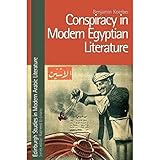Conspiracy in Modern Egyptian Literature / Benjamin Koerber.
Material type: TextSeries: Edinburgh Studies in Modern Arabic Literature : ESMALPublisher: Edinburgh : Edinburgh University Press, [2022]Copyright date: ©2018Description: 1 online resource (248 p.)Content type:
TextSeries: Edinburgh Studies in Modern Arabic Literature : ESMALPublisher: Edinburgh : Edinburgh University Press, [2022]Copyright date: ©2018Description: 1 online resource (248 p.)Content type: - 9781474417440
- 9781474417457
- 892.7/3609962
- online - DeGruyter
| Item type | Current library | Call number | URL | Status | Notes | Barcode | |
|---|---|---|---|---|---|---|---|
 eBook
eBook
|
Biblioteca "Angelicum" Pont. Univ. S.Tommaso d'Aquino Nuvola online | online - DeGruyter (Browse shelf(Opens below)) | Online access | Not for loan (Accesso limitato) | Accesso per gli utenti autorizzati / Access for authorized users | (dgr)9781474417457 |
Frontmatter -- Contents -- Series Editor’s Foreword -- Note on Transliteration and Translation -- Acknowledgements -- Introduction -- 1 Dramaturgies of Conspiracy: Bakathir, Idris and the July Regime -- 2 Naguib Surur: The Poetics and Politics of Niyāka -- 3 Sonallah Ibrahim’s al-Lajna: Between Critical Theory and Conspiracy Theory -- 4 Gamal al-Ghitani’s Ḥikāyāt al-Khabīʾa: The Fitna of Sexual Deviance -- 5 Paranoia in the Second Degree: Three Recent Novels -- Epilogue -- Appendix -- Notes -- Bibliography -- Index
restricted access online access with authorization star
http://purl.org/coar/access_right/c_16ec
Examines the diverse uses of conspiracy theory in Egyptian fiction over the last centuryProvides the first critical study of conspiracy theory in Arabic literatureExamines work by authors who have received little critical attention in English (Youssef Rakha, Mohammad Rabie, Ahmed Naji)Examines the recent “authoritarian turn” of some Egyptian authorsContains an Arabic edition and partial translation of Naguib Surur’s infamous underground quatrainsConspiracy theory in the Arab World has come to be associated with the rhetoric of Islamist extremists and authoritarian regimes. Yet its principle tropes – omnipotent secret societies, impending apocalypse, heroes who crack codes – have recurred in Arabic literature as well. A number of Egyptian authors, including Ali Ahmad Bakathir, Naguib Surur, Sonallah Ibrahim, Gamal al-Ghitani, and Youssef Rakha have crafted potent narratives of conspiracy that have remained unexamined until now.In a series of case studies, this book examines the diverse uses of conspiracy theory in Egyptian fiction since the early twentieth century. Read against the historical and intertextual backgrounds of individual authors and their works, conspiracy theory emerges not as a single, rigid ideology, but as a style of writing that is equal parts literary and political.
Mode of access: Internet via World Wide Web.
In English.
Description based on online resource; title from PDF title page (publisher's Web site, viewed 29. Jun 2022)


